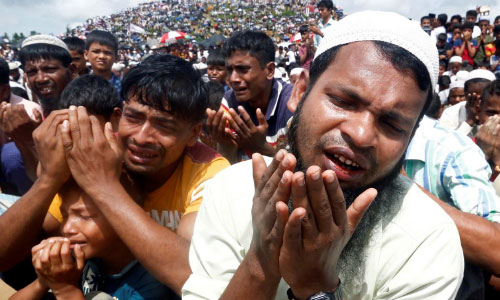COX’S BAZAR, Bangladesh - At least 100,000 Rohingya refugees rallied in camps in Bangladesh on Sunday, marking two years since the start of a brutal military crackdown in Myanmar that forced more than 730,000 to flee across the border.
Massive crowds gathered in the morning on a hillside for memorial prayers for relatives killed in the violence.
Others marched under the sweltering sun chanting, “We want justice” and “No more genocide”, some wearing white shirts bearing the words ‘Rohingya Genocide Remembrance’.
The commemorations took place amid heightened tensions in parts of the camps after security forces shot dead two Rohingya on Saturday, saying they were involved in the murder of a ruling party official.
More than one million people live in the camps in southern Bangladesh in the world’s largest refugee settlement. The majority having fled violence in 2017 that the United Nations says was executed with “genocidal intent”.
Refugees say Myanmar’s security forces and Buddhist civilians carried out mass killings and gang rapes during weeks of “clearance operations”. Myanmar denies those accusations and says they were conducting legitimate operations against Rohingya insurgents who attacked police posts.
“We miss our home, our relatives, our beloved ones who were killed in Myanmar,” said Chekufa, the leader of the Rohingya Women’s Empowerment and Advocacy Network, which organized one of the demonstrations. “We miss them very much today.”
Efforts to begin repatriating 3,450 Rohingya cleared by Myanmar failed on Thursday after none agreed to go.
In Myanmar, Rohingya are denigrated as illegal immigrants from Bangladesh, denied citizenship, and subjected to tight restrictions on freedom of movement.
Despite squalid conditions in the Bangladesh camps, refugees are fearful of returning home without assurances of citizenship and security.
“We are very grateful to the Bangladesh government, but we are living here not like humans but like animals, just eating and sleeping,” Chekufa said. (Reuters)
Home » World » Tens of Thousands of Rohingya Mark ‘Genocide Day’ Amid Tensions in Bangladesh Camps
Tens of Thousands of Rohingya Mark ‘Genocide Day’ Amid Tensions in Bangladesh Camps

